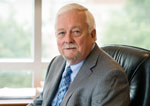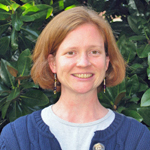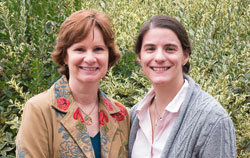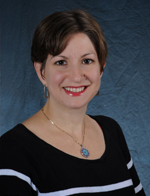View from the 5th – December 2013

December 2013 – The Value of Service

Service is a major part of who we are at the Health Sciences Library. It’s an important part of our day-to-day work, our five-year strategic plan, and our mission to connect people everywhere with knowledge to improve health. Some of our services reflect traditional library roles, like helping discover information in books, journals and databases, as well as providing welcoming and flexible study and meeting space. But the services we provide also go beyond these traditional roles and highlight the breadth and depth of our work.
This View from the 5th shines a spotlight on some of our talented librarians and the unique services they provide. You’ll read about Mellanye Lackey and her work informing a campus-wide conversation about sexual assault. You’ll also learn more about how Christie Silbajoris stepped into a new service role helping shape patient safety and education within UNC Health Care. Finally, you’ll meet Dawne Lucas, the newest member of our team, whose service work includes using exhibits and outreach to raise awareness and use of our rare and unique holdings.
We strongly believe the wide ranges of services we provide to students, faculty and researchers within health affairs at UNC offers our users a margin of excellence that cannot be found anywhere else. We are able to provide that margin of excellence because of generous and dedicated support from Friends like you. Thank you for being our partner in all of our work.
Sincerely,
Jim Curtis
Interim Director, Health Sciences Library
In this Issue:
- Librarians Contribute to a Campus Conversation
- HSL and UNC Health Care Partner on Patient Education
- HSL Welcomes New Special Collections Librarian
Librarians Contribute to a Campus Conversation
From a recent cover story in the Carolina Alumni Review to a collection of articles on The Daily Tar Heel’s website, campus sexual assault has been a major focus at The University of North Carolina at Chapel Hill. This coverage has not only reflected federal reviews in which the University is involved; it has also illustrated a growing conversation for colleges and universities nationwide. At UNC, this conversation has sparked a commitment to reviewing and developing resources – and led to librarian involvement in supporting this process.
In spring 2013, UNC expanded its work to evaluate procedures surrounding sexual harassment with the creation of a Chancellor’s Task Force on Campus Sexual Assault. The 22-member task force’s efforts built upon nearly two years of policy review and revision that followed new U.S. Department of Education’s Office for Civil Rights guidelines. Throughout the past six months, the group has concentrated on recommendations for shaping an updated University policy. It has also worked to design resources to both assist victims of sexual assault and to educate the campus community about the issue. In each case, its members have focused on grounding their plans in existing research.

As with many projects that involve research, the task force’s work has often involved the dual challenge of knowing where and how to find information. In late September, task force member Sandra Martin, Professor and Associate Dean for Research at the Gillings School of Global Public Health, faced this challenge when she took charge of its work to find information on serial sexual assault perpetrators. As she began her search, her thoughts turned to Mellanye Lackey, Public Health Liaison Librarian and Director of the HSL’s Global Engagement. Martin had previously contacted Lackey with queries that ranged from accessing materials for her research in maternal and child health to teaching effective search strategies to her doctoral students. Although this project differed from the assistance that Lackey had provided in the past, it seemed to fit her skillset.
“From my work with Mellanye and the HSL, I’d come to see librarians as a GPS for information,” Martin said. “They’re always responsive, and they seem to know how to find information on anything or anyone. When Mellanye indicated that she could assist, I was delighted – I knew it would add a strong foundation to our work.”
After accepting Martin’s request and learning more about her information needs, Lackey enlisted the help of fellow librarians and graduate assistants to ensure that she gathered information efficiently. Together, they focused on gathering a broad range of reliable information that the task force could use in its policy planning discussions.
“As librarians, our role isn’t to make policy, but we can provide information that will support policymaking and contribute to designing informed policies,” Lackey said. “That being said, I’ve really valued this opportunity to support the task force and to contribute to this issue of campus and national importance.”
Throughout their research process, Lackey and her colleagues particularly focused on finding resources that would help the task force answer a specific question: how many sexual assaults at a college or university are committed by the same individual. By the time the task force reconvened, they had accumulated and organized materials from an array of peer-reviewed publications and “grey literature,” such as reports and conference proceedings, to share with its members.
While her initial request to Lackey is complete, Martin said that she is hesitant to state that her work with the HSL on campus sexual assault is over. As both the task force’s efforts and conversations across campus continue, she sees potential opportunities to future collaboration.
“As we implement a policy and focus on keeping it up-to-date, I think there will likely be a need to evaluate it and think about how other institutions are doing things,” Martin added, “and this would be an area where research support would be particularly important.”
Lackey notes that, while the HSL’s work on this initiative may be a new venture for the library, the road that led to it is one that librarians experience frequently.
“It’s exciting to think about the relationships we build by working with individual schools and departments,” she said. “What starts out as something as basic as ‘Can you help find this article?’ could lead to further conversations and valuable opportunities to work together.”
More information about UNC’s campus conversation on sexual assault can be found at http://campusconversation.web.unc.edu/
HSL and UNC Health Care Partner on Patient Education
A discussion about the most effective way to share health information with patients and the public has grown into a unique collaboration between the Health Sciences Library and UNC Health Care.
In September 2012, Christie Silbajoris, Consumer Health Librarian, was leading the effort to redesign NC Health Info, a consumer health website and HSL service for which she serves as Director. She invited several practitioners from UNC’s Medical Center, the parts of UNC Health Care on the Chapel Hill campus, to visit the library and share their thoughts. Among attendees was Leslie Mason, Quality and Organizational Excellence Leader in the Department of Performance Improvement and Patient Safety (PIPS). Mason had recently assumed administrative responsibility for patient education work at the Medical Center, including serving as co-chair of a committee dedicated to this effort.

As conversations about the need for hospitals to increase their focus on patient education ramped up, both at UNC and around the country, Mason and the Patient Education Committee co-chairs sought to organize the committee’s resources, unify its members and enhance its presence. Although she came to the HSL to share her perspective on NC Health Info, as she listened to Silbajoris, Mason became increasingly excited about the contributions that a librarian could make to the Patient Education Committee’s work.
“The initial meeting with Christie and the NC Health Info project team helped the Patient Education team understand the value that someone with her skillset could bring to our work,” Mason said.
This initial meeting led to further conversations, which, in turn, led to a plan that would enable Silbajoris to provide liaison services to the Patient Education Committee and PIPS while also continuing her work in consumer health.
“The opportunity was one that I never expected, but it has been a great way to think about health information from a new point of view,” Silbajoris said. “It’s been extremely rewarding to expand my knowledge and help make sure both patients and practitioners get information they can use.”
In the year since adding “Patient Education Librarian” to her title, Silbajoris has served as a Patient Education Committee co-chair, alongside Mason, Jill Hill and Deborah Ballard, both Oncology Patient Education Coordinators at Lineberger Comprehensive Cancer Center, and helped support monthly meetings that bring together a large multidisciplinary team from across the Medical Center. The team collaborates to standardize the process of providing patient education, as well as promoting health literacy and training initiatives.
Another key component of patient education work throughout the past year has been supporting UNC’s Health Care’s transition to a streamlined electronic medical records (EMR) system. As UNC Health Care has expanded from Chapel Hill to include services and facilities across neighboring counties, the need to implement a single EMR has also grown. UNC took steps to address this need by setting the goal of “one patient ID, one problem list, one medication list, and one bill,” regardless of facility location. In late 2012, they partnered with EMR vendor Epic to implement a system that would meet this vision.
To prepare for the Epic@UNC implementation, UNC Health Care has focused on locating, organizing, and cataloging all of the “homegrown” patient education materials that individual departments and practitioners have created. This undertaking has been a significant part of the Patient Education Committee’s work, and Silbajoris has played a central role in it.
“One of my main tasks has been reaching out to and meeting with as many departments and individuals as possible, so that we can better understand their needs,” Silbajoris said. “Many groups had years of documents they’ve created, some stored on computers; others in file cabinets. We wanted to make sure that we knew what materials existed and secured copies of everything that they had an interest in saving and moving to Epic. We also wanted to foster conversation and build relationships, so that we can continue these conversations in the months to come.”
In addition to playing an important role in the information gathering and vetting process, Silbajoris made it easier for other committee members to take part in this process. She worked with the HSL to create and manage a wiki that enabled the committee to search for and review all of the information they’d gathered in one accessible online space.
“We knew that we needed a space where care providers in any location with access to the Intranet could get to patient education content; we just weren’t sure how to operationalize this, and that’s where Christie’s expertise was instrumental,” Mason said.
A phased rollout of the Epic@UNC EMR system is set to begin in April 2014, and throughout the next few months, members of the committee will continue to review and prepare content for its launch. Silbajoris will also continue to serve as a committee co-chair, helping support both Epic implementation tasks and other PIPS initiatives, such as its work to better tailor health literacy and training to departmental needs.
“We’ve definitely gotten more than our money’s worth with Christie,” Mason said. “She has a great disposition and a calming influence, which has been especially important in the transition that the Medical Center and UNC Health Care are undergoing with regard to patient education. We appreciate how willing and enthusiastic both she and the library have been about developing a real partnership to do this important work.”
HSL Welcomes New Special Collections Librarian

The Health Sciences Library (HSL) at The University of North Carolina at Chapel Hill is proud to welcome Dawne Lucas as our new Special Collections Librarian.
Lucas will continue to build and steward HSL’s Special Collections, which include a wide variety of materials recognized for being unique or for having historical value. She will lead library efforts to ensure that these materials will be discoverable, usable and effectively preserved for anyone within the Carolina community and beyond.
“The special collections at the HSL are a true gem and widely valued by the faculty, researchers and students at UNC,” said Lucas. “I’m thrilled to be able to help care for and grow this collection and to be a part of one of the best libraries in the country.” Special Collections at the HSL include not only printed works, such as books, pamphlets, journals, broadsides, posters, and ephemera, but also manuscripts, letters, photographs, student notebooks, drawings, and other documents, as well as medical instruments, artifacts, models, and other cultural objects. These materials range in date from the 1500s to the present day, encompassing the history of medicine, dentistry, pharmacy, nursing, public health, and the allied medical sciences. The history of the health sciences in North Carolina is strongly represented.
Printed rare books and manuscripts make up a significant portion of Special Collections at the Health Sciences Library. Just a few noteworthy items among many are, Vesalius’ 1543 anatomical classic, De Humani Corporis Fabrica; Edward Jenner’s 1798 work on smallpox, An Inquiry into the Causes and Effects of the Variolae Vaccinae . . .; and The Confederate States Medical and Surgical Journal.
Prior to joining UNC, Lucas was the Head of Technical Services at the Duke University Medical Center Archives. While completing her Masters of Library Science from the School of Information and Library Science at UNC she worked as a research assistant in the Southern Historical Collection.






